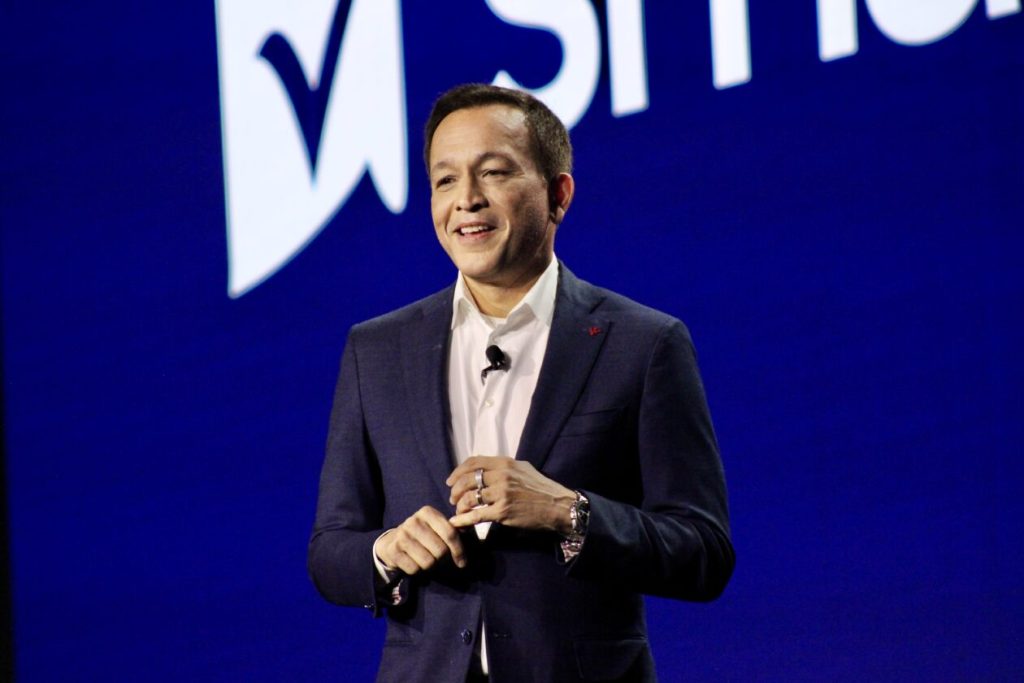
Rajeev “Raj” Singh It has made a career out of seeing the next wave before it hits. He made a software-as-a-service bet three decades ago with travel spending giant Concur. He made a bet on virtual care with Accolade before telehealth went mainstream.
Now, he’s betting that SmartSheet could redefine enterprise software for the AI era.
“If this transformative moment hadn’t happened, I probably wouldn’t be here,” Singh said in an interview with GeekWire after his keynote. Smartsheet Engage at the Seattle Convention Center.
Singh took the stage Wednesday morning at the company’s annual conference — best known for helping businesses organize and track work less than 30 days into his new role as CEO of the Bellevue-based software maker.
Founded two decades ago, Smartsheet is one of the region’s iconic technology companies, with a large customer base of large businesses and annual revenues of more than $1 billion. It went private earlier this year in an $8.4 billion deal with Vista Equity Partners and Blackstone.
SmartSheet competes in a crowded and fast-evolving market for productivity and work-management software that includes legacy players like Microsoft, Google, and Salesforce, along with new challengers including Asana, Monday.com, Airtable, and ClickUp.
Singh, who succeeded longtime CEO Mark Meader, framed the transition as an opportunity to challenge SmartSheet’s old ideas. He mentions enterprise buyers who still ask if it’s just an “online spreadsheet company” or a to-do list manager.
“It’s time to step out of the shadow of SmartSheet,” Singh said in his keynote address at the conference, which runs Nov. 5-7 and attracts about 5,000 attendees.

Wednesday Smartsheet announcement The new feature combines AI agents, knowledge graphs and automation as part of its “intelligent task management” platform. The update introduces tools like Smart Assist, Smart Flows, and Smart Agent to help teams create projects, manage tasks, and automatically identify potential issues. It adds new enterprise features such as scenario planning and security scores to give companies more control and visibility across their operations.
Singh describes the evolution of AI in three phases: copilots as generation one, autonomous agents as generation two, and cross-system automation — the integration of multiple enterprise technology stacks — as generation three.
“That end is really hard, and only a few companies in the world can do it,” Singh said. “We’re going to be one of those who lead the world there.”
He said Smartsheet focuses on using AI to drive business results.
“Agents are by definition not valuable,” Singh said. “What’s valuable is productivity. What’s valuable is revenue. What’s valuable is cost reduction. What’s valuable is quality improvement. You can charge for that — AI is a tool, not a revenue model.”
Under the new private equity ownership, Singh said, Smartsheet has more freedom to accelerate.
“It gives us more license to do what we need to do — and to go fast — what we need to do,” he said.
Asked how SmartSheet will compete against AI-driven startups to address work productivity, Singh — who recently invested in a Seattle-area AI company — said incumbents are still “if they have the guts.”
“The dominant advantage is the customer, the workflow, the data,” he told GeekWire. “If I have petabytes of data and you have nothing — if you beat me by understanding my customer better than I do, then I was asleep at the switch and I should have lost.
“You can go fast building software, but I have to go fast building intuition. And if I lose, it’s because I was lazy. If I lose, it’s because I wasn’t paying attention. And I’d like to think it won’t be us.”

